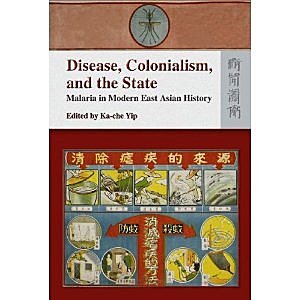
版主:從蔣竹山老師的部落格轉貼一則書訊。
疾病、殖民主義與國家:近代東亞歷史中的瘧疾
Disease, Colonialism, and the State: Malaria in Modern East Asian History
Ka-Che Yip
Hardcover: 161 pages Publisher: Hong Kong University Press (May 30, 2009)
Studying malaria in modern East Asia in the context of the global history of the disease, this book fills an important gap in our understanding of the cultural, social, economic, and political dimensions of the relationship between malaria and human society in a region which has often been neglected by historians of the disease. The authors examine the development and consequences of various anti-malaria strategies in Hong Kong, Okinawa, Taiwan, mainland China, and East Asia as a whole. The British and Japanese colonial models of disease control are explored, as is the later American technological model of DDT residue spraying, promoted by the Rockefeller Foundation which played a significant role in the global anti-malaria campaign and the development of public health in Asia. In the post- World War II period, the use of DDT and international political and economic interests helped to shape anti-malaria policies of the Nationalist government in Taiwan. In mainland China, the Beijing government's mass mobilization and primary health care model of anti-malaria control has given way to new strategies as recent changes in the health care system have affected anti-malaria efforts and public health developments.
About the Author
Ka-che Yip is professor of history at the University of Maryland Baltimore County.
http://www.amazon.com/Disease-Colonialism-State-Malaria-History/dp/9622095879/ref=sr_1_3?ie=UTF8&s=books&qid=1277429870&sr=1-3
http://www.amazon.com/Disease-Colonialism-State-Malaria-History/dp/9622095879/ref=sr_1_3?ie=UTF8&s=books&qid=1277429870&sr=1-3
全站熱搜




 留言列表
留言列表

 {{ article.title }}
{{ article.title }}